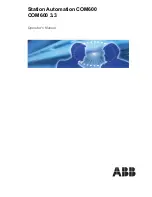
36
Chapter 3 CS 1000 considerations
N0060720
N0060720
IP Phone users in Normal Mode use the feature set on the main office. IP Phone users in Local
Mode, receive only those features and tones that are provisioned on the SRG. Users of analog
(500/2500-type) telephones always use the feature set on the SRG.
Survivability
SRG provides survivability against WAN failure, main office Call Server failure, main office
Signaling Server failure, and Gatekeeper failure.
In the event of a WAN failure, the SRG IP Phones lose communication with the main office. This
causes the SRG IP Phones to reset and register with the SRG. The IP Phones then operate in Local
Mode, providing services based on a limited SRG feature set, which has significant differences
from the CS 1000 software.
If the main office Call Server fails and call processing services are provided by an Alternate Call
Server, the SRG IP Phones reset and reregister with the Alternate Call Server and receive call
processing services from it.
If no Alternate Call Server is available, the SRG IP Phones go to Local Mode while the SRG
attempts to find an Alternate Call Server by way of the NCS.
If the main office Signaling Server fails and an Alternate Signaling Server is available, the SRG IP
Phones reset and reregister with the SRG. The SRG will then query the NCS for the Alternate
Signaling Server’s IP address. The SRG will redirect the IP Phone to the Alternate Signaling
Server and continue to receive call processing services from the main office Call Server. If no
Alternate Signaling Server is available, the SRG IP Phones reset and register with the SRG in
Local Mode.
When an IP Phone at the SRG first boots up, it attempts to communicate with the SRG. Once it has
established communications with the SRG, the SRG will redirect it to the main office. When the
SRG IP Phone attempts to register with the main office, the SRG first queries the Primary NRS
(NCS) for the main office Virtual Trunk node IP address to redirect the IP Phone. If the Primary
NRS (NCS) is down or unreachable, the SRG queries the Alternate NRS (H.323 Gatekeeper), if
one is specified. If it receives a positive response, the SRG IP Phone is redirected to the specified
main office. Otherwise, if neither a Primary or an Alternate NRS (H.323 Gatekeeper) is available,
the SRG IP Phone remains in Local Mode, and receives call processing services from the SRG
until communication can be reestablished.
SRG IP Phones in Normal Mode remain registered with the main office if the Primary NRS fails
and no Alternate NRS is available. They can call any main office telephone or IP Phones in
Normal Mode in other branch offices. However, they cannot call any SRG analog (500/2500-type)
telephones or any external numbers through the SRG trunks because the VoIP trunks are not
available. (SRG analog [500/2500-type] telephones are accessible if alternate routing is available
through the PSTN.)
Содержание SRG50
Страница 1: ...Part No N0060720 03 December 2007 Survivable Remote Gateway 50 Configuration Guide...
Страница 4: ...4 Task List N0060720 N0060720 Glossary 107 Index 109...
Страница 8: ...8 Contents N0060720...
Страница 26: ...26 Chapter 1 Getting started N0060720 N0060720...
Страница 50: ...50 Chapter 3 CS 1000 considerations N0060720 N0060720 Figure 6 S1000 IP Terminal Details panel...
Страница 62: ...62 Chapter 4 CS 2000 considerations N0060720 N0060720...
Страница 100: ...100 Chapter 8 Troubleshooting N0060720...
Страница 106: ...106 Telephone features in normal and local mode N0060720...
















































